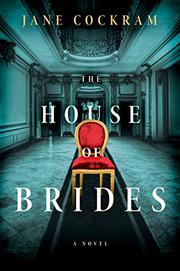

THE HOUSE OF BRIDES
by Jane Cockram
A disgraced Australian wellness guru heads up the cast of a du Maurier–inspired thriller.
“Yesterday I found an article about Barnsley House in an old magazine.” Just as this doesn’t quite have the resonance of “Last night I dreamt I went to Manderley again,” Cockram’s debut—containing characters named Daphne and Max Summer (not de Winter), an evil housekeeper, a house fire, etc.—does not benefit by comparison to its model. So let’s forget that for now. “ ‘Promise me, Miranda. Promise me not to be ordinary.’ Her lip curled slightly at the word. ‘Promise me you’ll be an amazing woman too.’ " The late Tessa Summer’s exhortation to her daughter, Miranda, may have inspired the ambition that led to Miranda's claims that her Instagram-famous healthy recipes could cure infertility, but the only amazing things about her moment in the spotlight are a) that it ever happened, and b) the public humiliation that followed. Now Miranda’s appropriated Daddy’s credit card and is headed to the English country estate where her mother was raised, currently a destination restaurant and hotel, whose history Tessa wrote about in an international bestseller called The House of Brides. Apparently a compulsive liar, Miranda pretends she’s answering an ad looking for a nanny rather than reveal her blood relationship to the Summer family. The littlest child is in a wheelchair, there’s a cracked-up car in the driveway, the hotel and restaurant are closed, the kids' uninvolved mother vanishes within days of Miranda’s arrival, and on top of all this tsuris, the accidental nanny develops obsessional “cravings for food devoid of any nutritional value.” When she tears up upon hearing someone finally say something nice about Tessa, she attributes it to “all the processed food I was eating.” One hopes this is supposed to be funny. Parody would have been the best bet for this novel, with its two-dimensional characters, passion for clichés, and bewilderingly overcomplicated plot which relies on novelistic diary passages and closed-circuit security videos to make any sense at all.
Amateurish and often laughable—but at least it’s not ordinary.